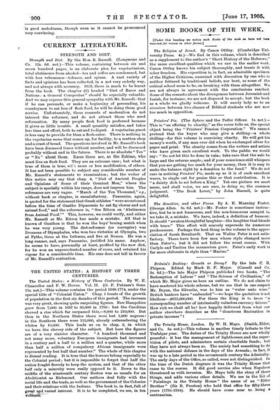Strength and Diet. By the Hon. R. Russell. (Longmans and
Co. 12s. 6d. net.)—This volume, containing between six and seven hundred pages, is an elaborate plea for vegetarianism, total abstinence from alcohol—tea and coffee are condemned, but with less vehemence—tobacco, and opium. A vast variety of facts and opinions has been collected, in a not very orderly way, and not always with accuracy, Still, there is much to be learnt from the Vook. The chapter (6) headed "Diet of Races and Nations : a General Conspectus" should be especially valuable. And we may express this general sympathy with Mr. Russell : that if he can persuade, or make a , beginning of persuading, his countrymen to eat less of flesh food, he will be doing them good service. Unfortunately, these counsels of moderation do not interest the reformer, and do not attract those who need reformation. By many people flesh food is preferred because it gives so little trouble. A small quantity satisfies, and takes less time and effort, both to eat and to digest. A vegetarian guest is less easy to provide for than a flesh-eater. There is nothing in the vegetarian menu that comes up, for facility, to a mutton chop and a crust of bread. The questions involved in Mr. Russell's book have been discussed times without number, and will be discussed probably without and in the future. There is no absolute " Yes " or "No" about them. Races there are, as the Eskimo, who must live on flesh food. They are an extreme case ; but what is true of them is true, wit'i more or less modification, of others. It has not been possible to subject any considerable number of Mr. Russell's statements to examination ; but the writer of this notice may say that chap. 4, " Diet of Ancient Peoples and Opinions. of Some• of their Greatest Men," where the subject is specially within his range, does not impress him. The references are very vague. " March of the Ten Thousand," e.g., without book or chapter, is unsatisfactory. Pausanias, again, is quoted for the statement that Greek athletes " were accustomed before the time of Gnatho Dipaeensis to eat fig cheese and not animal food," and the reference is, " See Ritson on 'Abstinence from Animal Food." This, however, we could verify, and either Mr. Russell or Mr. Ritson has made a mistake. All 'that is known of Gnathon is that ho won the boys' boxing match when he was very young. The diet-reformer (or corrupter) was Dromeus of Stymphalus, who won two victories at Olympia, two at Pytho, three at the Isthmus, and five at Nemea. He was a long runner, and, says Pausanias, justified his name. Anyhow, he seems to have, personally at least, profited by the new diet, for he won an unprecedented number of races, and retained his vigour for a considerable time. His case does not tell in favour of Mr. Russell's contention.






































 Previous page
Previous page